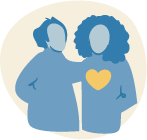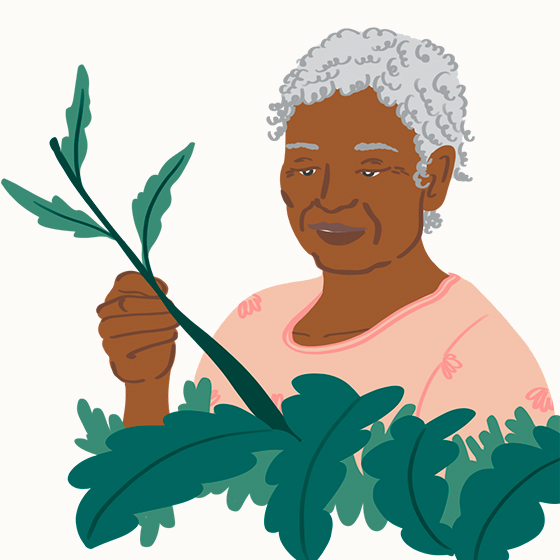Older adults
Support for older adults who want to transition or access gender-affirming care

This page is a resource for older trans, Two-Spirit A term used within some Indigenous communities to reflect complex Indigenous understandings of gender and sexuality and the long history of sexual and gender diversity in Indigenous cultures. Two-Spirit encompasses sexual, gender, cultural and spiritual identity. It may refer to cross-gender, multi-gender or non-binary gender roles, non-heterosexual identities, and a range of cultural identities, roles and practices embodied by Two-Spirit peoples. Some people also use "2-Spirit" or "2S." (Source: Battered Women’s Support Services) , and non-binary Umbrella term referring to people whose gender does not fall within the binary gender system of woman/girl or man/boy. Some individuals identify as non-binary while others may use terms such as gender non-conforming, genderqueer, or agender. Non-binary people may or may not conform to societal expectations for their gender expression and gender role, and they may or may not seek gender-affirming medical or surgical care. adults at any stage of their gender journey.
While not all the information on this page will be relevant to every person, we hope it will help you to set expectations and feel better prepared to navigate your gender journey.
Social transition
Many people transition later in life. Some have always known their true gender is different from what they were assigned at birth. Others discover this self-understanding later on. No matter the path, many older adults find claiming their true identity to be a very positive experience.
It’s never too late to transition
There is no age limit to expressing your true self, and no one correct way to go about this process. The Explore & Transition section of our website is written to help you understand the transition journey and available options.
Exploring your gender
Expressing your gender
Coming out to family & friends
Social attitudes have changed a lot over time. However, older adults may face unique challenges when coming out to family and friends. You may have long-standing relationships with family, community members, and colleagues. These people now need to rethink their understanding of you.
Here are resources to help the people in your life understand you and your gender.

Coming out
If you’re looking to share resources to help your family, friends, and peers adjust to the changes in your life, you may wish to share our page Information for partners & spouses, or the guide How to be an Ally to Transgender Older Adults from FORGE.

Seeking support
If your family members are interested in attending a peer support group, you can connect them with PFLAG Vancouver, which holds virtual meetings.
Gender-affirming health care
Getting started
Our website has detailed information to guide you through the process of:
Contact our team of experienced health navigators for information about gender-affirming care in B.C.
Care at any age
There is no age cutoff for gender-affirming medical or surgical interventions. Health care providers assess the safety of hormone therapy on an individual basis, rather than one factor such as age.
Hormone therapy for older adults
Some general health risks are known to increase with age. Older adults are more likely to have chronic health conditions such as high blood pressure or cholesterol problems. Older adults are also more likely to be taking several medications, increasing the possibility of unwanted medication interactions.
For these reasons, hormone therapy may be modified for older adults. For example, transdermal forms of estrogen are typically recommended for older adults to decrease the cardiovascular risk.
If hormone therapy cannot be used due to safety issues, other options for gender affirmation The ways a person can be supported in expressing their self-identified gender. This may involve supporting social transition steps or changes in gender expression. may be possible. For example, breast surgery may be a safer option than estrogen for some people.
The specific results of gender-affirming hormone therapy vary from person to person and are impacted by factors such as hormone dosing, genetics and age. It’s impossible to know exactly how a given person’s body will respond to hormones, at any time in their life.
Some ways that the initial impacts of gender-affirming hormone therapy may be different in someone starting hormones later in adulthood include:
- New breast tissue may be of a lower density compared to a younger person.
- The number of active hair follicles decreases with age, meaning the introduction of testosterone might have less impact on hair growth.
- Sexual function may be impacted, especially if combined with preexisting cardiovascular disease or issues with the flow of blood to genital tissue.
For many people, no matter their age, subtle changes continue to progress over time as a result of both the presence of a gender-affirming hormone and the suppression of a natal hormone.
There is a relative shortage of scientific research and literature about menopause in general, so research on the intersection of menopause and gender-affirming care Processes through which a health care system cares for and supports an individual while recognizing and acknowledging their gender and expression. is even more scarce. However, your provider can work with you individually to take menopause-related considerations into account.
Estrogen & menopause
For people taking or seeking estrogen-based hormone therapy, your provider can work with you to navigate the dosage levels that will support your goals. Some people maintain steady dosage levels as they age, while others may shift to lower dosages to minimize cardiovascular risk. For some people, a menopause-like hormone trajectory may feel affirming.
Testosterone & menopause
Testosterone can prevent or delay the onset of menopause in some people, and its introduction will typically calm any menopausal symptoms. That being said, two common symptoms associated with menopause, irritability and internal genital dryness, can be exacerbated by testosterone in some. Every person’s experience of menopause is unique, and the specific impact of testosterone-based hormone therapy will depend on the individual.
Hormone-dependent cancers, such as breast or prostate cancer, are types of cancer that rely on hormones for their growth and development.
If you have been diagnosed with a hormone-dependent cancer, you may wish to begin or continue gender-affirming hormone therapy in spite of higher risk. It’s important to consider your overall quality of life and determine your priorities. For example, a person dying of a hormone dependent cancer may want to continue or restart hormone therapy even knowing the risk of worsening their disease and shortening their life is high. The health care team can help weigh out the pros and cons of this decision.
Surgery for older adults
Many older adults have successful experiences with gender-affirming surgery, and your health care team can support you to explore your options and maximize your potential outcomes.
Risks associated with surgery
Surgical risk commonly increases with age. This is particularly true if you have health conditions that increase the risk associated with anesthesia, such as cardiovascular issues. To mitigate these risks, a surgeon may request the anesthesia team do a pre-operative review with you to plan for the safest anesthetic possible and they may also recommend shorter procedures that are less invasive.
Healing & recovery
Tissue integrity and skin elasticity change over time, and this affects the process of healing from surgery, as well as the physical appearance of results. When doing research about other people’s surgical stories to get a sense of what to expect, it’s important to keep this in mind. Your surgeon will take this into account and may recommend procedures with a shorter healing timeline, in order to reduce the chance of complications.
Anticipate longer surgical recovery periods compared to someone younger. If you have limited mobility, your surgical care plan should address the supports needed for you to maintain a post-operative routine, such as dilations or changing of drains Thin tubes placed in the body during surgery to remove excess fluid or blood. .
End of life planning
It can be hard to think about and plan for the end of our lives. We may feel it’s too early and not worth our time at the moment. However, being prepared for the unexpected can allow ourselves and our loved ones to feel more confident and secure about the future.
Considerations for end of life
Planning proactively helps us avoid a situation where important choices about our care are being made by people with inadequate information or who don’t have our best interests in mind. This can be especially important if we don’t have a legal next of kin whom we trust with these decisions.
Guiding questions to ask yourself include:
Who do I trust to make decisions for me about my health and finances? Are there people in my life whom I don’t trust to make these decisions?
Which people do I want to ensure have hospital visitation rights?
What names and gendered language do I want to be used at my funeral and in my obituary?
If I have an open casket funeral, how do I want to be dressed and presented?
Who do I want to inherit my property and assets?
Dignity Seniors Society has a list of resources available to aid 2SLGBTQIA+ seniors in Financial and end of life planning, as well as a list of Pro bono legal services.
Advance directives
Advance directives are legal documents that support us to ensure our wishes are respected, no matter what happens. This includes what happens to our things after we die, as well as who is given the power to make medical and financial decisions for us if we are unable to do so for ourselves.
Examples of advance directives include:
- Will
- Living will
- Medical and financial power of attorney
- Beneficiary designations
- Real estate ownership agreements
- Funeral and hospital visitation directives
Help with advance planning
Seniors First BC hosts regular Advance Planning Clinics in several B.C. communities. Their staff can help eligible low-income older adults (55+) with drafting and executing Wills, Powers of Attorney, and Representation Agreements. For more information, visit the Seniors First BC website or call 604-437-1940 or 1-866-437-1940. Please note that Seniors First BC is not a 2SLGBTQIA+-specific group.
Sources of support
Being a gender diverse Refers to gender roles and/or gender expression that do not match social and cultural expectations. older adult comes with unique challenges and life experiences, and many people find it easier to navigate their journey when connected to support. This could look like help completing forms, understanding your options or getting documentation from other practitioners.
Support through primary care clinics
Primary care hubs like community health centres often have interdisciplinary teams that include allied health professionals such as occupational therapists and social workers. Many urgent care centres and even some walk-in centres also have staff to help people find support. The services available to you will vary based on your region.
Support through seniors groups
Dignity Seniors Society has a Resources page collecting support options for 2SLGBTQIA+ older adults related to housing, health, community building and legal and financial help. If you are disabled, advocacy organizations like LET’S or Disability Alliance BC can also offer resources and assistance.
Combating loneliness & isolation
Many older adults experience loneliness and isolation. Finding ways to stay connected and build nurturing relationships though community organizations or accepting faith communities can provide an important lifeline.
Connecting with a peer support group made up of others who understand your experiences can also help with feelings of loneliness and provide useful advice. QMUNITY has a number of Older Adults and Seniors programs many of which are available online for people across B.C.
Trans Care BC’s Peer Support Directory contains other groups and services throughout B.C. for trans, Two-Spirit A term used within some Indigenous communities to reflect complex Indigenous understandings of gender and sexuality and the long history of sexual and gender diversity in Indigenous cultures. Two-Spirit encompasses sexual, gender, cultural and spiritual identity. It may refer to cross-gender, multi-gender or non-binary gender roles, non-heterosexual identities, and a range of cultural identities, roles and practices embodied by Two-Spirit peoples. Some people also use "2-Spirit" or "2S." (Source: Battered Women’s Support Services) and non-binary Umbrella term referring to people whose gender does not fall within the binary gender system of woman/girl or man/boy. Some individuals identify as non-binary while others may use terms such as gender non-conforming, genderqueer, or agender. Non-binary people may or may not conform to societal expectations for their gender expression and gender role, and they may or may not seek gender-affirming medical or surgical care. individuals. You may also be able to find Facebook groups and other online communities for older trans people to exchange advice and support.
Resources for older trans people
Below is an evolving list of resources, and we welcome your input. If you have any resource recommendations you think are helpful, please contact us.
Websites
- How to be an Ally to Transgender Older Adults
- Still Here, Still Queer: A Handbook for Affirming LGBTQ+ Older Adults - The 519
- National Resource Centre on 2SLGBTQI Aging (Canada)
- National Resource Center on LGBTQ+ Aging (USA, contains resources relevant to Canadian context)
- LGBTQ+ Community Dementia Resources
Articles & Blogs
To Survive on This Shore: Photographs and Interviews with Transgender and Gender Nonconforming Older Adults — JESS T. DUGAN
Phone hotlines
BC Centre for Elder Advocacy & Support Seniors Abuse & Information Line (SAIL): 604 437-1940 or Toll-free: 1 866 437-1940
Community Voices

I first tried to access care in the early 2000s. My doctor at the time was not knowledgeable about how to support a trans person, and there was nowhere else to go. I tried to push it all below the surface. Later, due to a personal crisis and physical health scare, I realized that I wasn't going to take no for an answer. By then, everything had changed, and I was able to get the hormones and surgery I needed, but I was terrified somebody was going to pull the rug out from under me again.


